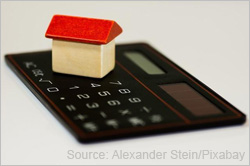
With the economy beginning to look better, more and more people are starting to transition from renting to buying, making it a fairly competitive market. Because the housing market is becoming more cut throat, being qualified for a mortgage
before you look for homes is going to be a huge help. Read on for tips on how to get approved for a mortgage and what you'll need to know before you apply.
Understand the market
During the housing crisis, lenders were offering mortgages to anyone and everyone including buyers they knew would end up in default. But even as the market is recovering, the crisis left its mark.
Mortgage underwriting, the criteria banks use to determine whether to make a loan, has become more stringent. However, that doesn't mean that younger couples or first-time buyers won't be approved, it just means that they need to be more prepared to prove to the bank that they are financially responsible and able to take on mortgage payments.
What you need before you start applying
- Before completing any applications, you'll need certain pieces of information:
- Your monthly income
- The sum of your total monthly debt payments - student loans, auto loans and credit card payments
- Credit score
- Credit issues from the past few years
- How much you can afford to put down
- You'll need to provide at least two months of pay stubs to your lender when you begin preparing for the loan process. Begin to collect pay stubs in advance so you're not scouring your house looking for them.
- If you're self-employed or have a variable income, the underwriting process will be more involved. You may have to submit copies of past tax returns.
- To get approved for a mortgage, you want to stay within certain ratios that lenders use to determine how much you can afford. Larger debt payments like auto or student loans will limit the size of mortgage you'll be approved for.
- Pay off as much of a large debt as you can before you start the application process. At the very least, don't take on any new loan payments.
Your credit score and history
Your credit score and credit history are important to the loan process. Before you apply for a mortgage, check both reports to make sure there are no errors or any recent derogatory items like late payments listed.

Your estimated FICO credit score should be at least 680 and preferably, above 700. If your score is less than that you may need to have a high-qualified cosigner or try to improve your score as much as possible before you try to apply on your own.
If your credit score is just below the 680 mark, then you may consider a Federal Housing Administration (FHA) loan. The government assisted loan allows for lower down payments and lower credit scores, but there are additional costs that will need to be considered.
TIP: DO NOT apply for new credit in the time leading up to your mortgage application. Banks and lenders become suspicious if it looks as though you're piling on more credit.
Mortgage budget
Before sitting down with a mortgage lender, you'll need to determine how much you can actually afford and are comfortable paying. A rule of thumb is that your total housing including fees, taxes and insurance should be no more than 35 percent of your gross income.
- Once you've estimated a monthly budget, begin planning how much you'll be able to save for a down payment. You should expect that your lender will require at least 10 percent of the total cost as a down payment. If you're getting an FHA loan or another special program loan, you'll need to consider what the required percentage is, which is often lower than a down payment for a traditional mortgage.
- If you can afford it, a 20 percent down payment will help you avoid private mortgage insurance (PMI) - insurance that protects the lender should you default on your loan.
- Do not let real estate agents, brokers, lenders or even yourself convince you to purchase more than you can afford with the thought that real estate will appreciate. That may be the case, but smaller payments are more favorable than getting in over your head.
What will the lenders ask?
At minimum, your mortgage lenders will ask you similar questions to the following:
- About your residential history: Where are you living now? How long have you lived there? Are you renting or do you own? Have you been late on your payments?
- About your employment and income: What is the name of your employer? How long have you been at your current job? What is your gross annual income? Do you have other sources of income?
- About your credit scores and history: What are your three major credit scores? Have you ever filed for bankruptcy? Have you ever had a foreclosure or a short sale? Are any of your accounts currently in collection?
- About your monthly debts and obligations: Do you make a car payment? Do you have student loans? Do you have credit card debt? Do you pay alimony or child support?
- About your cash reserves and bank accounts: What are the balances of your checking and/or savings accounts? What are the balances of your retirement accounts? What is the value of your investments in stocks, bonds and other securities?
Now that you know what to expect you can be better prepared to begin applying for a mortgage for your dream home.
Free moving quotes
Once you've finished closing on your new house, be sure to come back and visit Movers.com for
free moving quotes from companies in your area and
information about how to furnish, decorate and improve your new home.